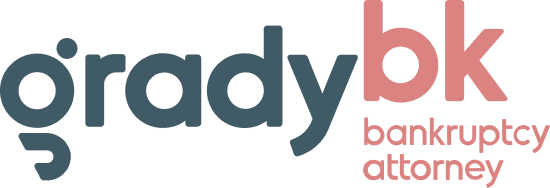When we are experiencing money troubles, there are few things that can help. We can look for better jobs, but everyone in America is feeling the pinch. We can try to reduce our spending, but grocery bills and healthcare costs are higher now than they’ve ever been. We can also try to consolidate our debts and restructure our finances, but that doesn’t fix the problem of not being able to afford the payments.
A quick and (relatively) easy step is to file for Chapter 7 bankruptcy and eliminate your unsecured debts entirely. This can be a lifeline to those who experienced a financial crisis during or after the pandemic and see no other way to find relief.
Chapter 7 is intended for people who really need it, so there are several necessary conditions that you must meet to be eligible. In this week’s article, we’ll discuss what those conditions are, how you can assess your situation yourself, and how our experienced bankruptcy attorney at Grady BK, PLLC can guide you through the process and answer all your questions. Bankruptcy is a tool to help those in need get out of debt, if you are experiencing hardships in Central New York or The North Country, call our office today for a free consultation.
Qualifying Conditions for Chapter 7 in New York
In order to see if you’re eligible for Chapter 7, we’ve provided a brief list of requirements. These are only general guidelines, so your case may need more attention. If you believe you meet all of these requirements, contact our bankruptcy attorney to go over your information. If anything is missing or purposefully left out, it can cause you even greater troubles down the road. Here are the things that qualify you for Chapter 7 in New York:
1. Live or Work in New York: You need to be living in New York, have a business here, or own property in the state.
2. Credit Counseling Class: Before you can file for bankruptcy, you must take an online credit counseling course. This has to be done within 180 days (about 6 months) before you file. It’s a course that gives you financial education to make better and more informed choices afterward.
3. Means Test: The Chapter 7 Means Test in New York tests if your income is low enough to file for bankruptcy by averaging your income over the past six months. This includes all income types, such as wages, child support, and your spouse’s income. You automatically pass if your income is below the state’s average for a family of your size. For example, as of December 2023, the average monthly income for a single person in New York is $5,533. For a family of two, it is $7,007. For three people, it is $8,438, and for a family of four, it is $10,516. Even if you do not meet the financial requirements, you may still be eligible. For instance, if you have a higher-than-average income but also higher-than-average expenses, you can still qualify. Expenses like high mortgages, several car payments, high healthcare costs, or the care of an elderly or disabled person can all qualify you for Chapter 7. What the Means Test really focuses on is how much disposable income your family has. If almost all of your monthly money goes towards debt or bills, you could qualify for Chapter 7.
4. No Recent Bankruptcies: Another requirement is that you can not have gone through a previous Chapter 7 bankruptcy within the last 8 years. This is what the credit counseling class aims to avoid. You will be educated on the best ways to manage your finances so you don’t wind up here again. However, as we said above, making enough money is difficult for everyone right now. So, another attempt is always possible after 8 years.
5. No Dismissed Bankruptcy in the Last 180 Days: If your bankruptcy case was dismissed within the last 180 days for any reason, you cannot file for bankruptcy again immediately. This can happen if you did not follow the court’s orders in your last bankruptcy case or if you decided to stop the case after a creditor requested the court to take action on their behalf. The 180-day waiting period is a rule designed to comply with legal procedures and also prevent misuse of the bankruptcy system. You’ll need to wait until 180 days are up before you can file again.
6. Honest Paperwork: If you don’t provide honest and complete information in your Chapter 7 bankruptcy, you could face serious consequences. These can include the denial of your bankruptcy discharge, fines for fraudulent reporting, or even criminal charges if it looks like bankruptcy fraud.
7. No Hiding or Illegal Transfers: You can’t try to hide your assets or move them around in a sneaky way to trick your creditors or the court. These professionals are trained to see through these common attempts and investigate them thoroughly.
8. Debtor Education Course: After filing for bankruptcy, but before your debts are eliminated, you need to take one more online class. This class teaches financial management skills, including budgeting, using credit responsibly, and managing money. The two required courses have different focuses and are both necessary for the bankruptcy process. The first is about exploring options and understanding your finances, while the second is about learning to manage your money after bankruptcy.
All of these steps are important to make sure you are eligible for Chapter 7 bankruptcy in New York. It’s a good idea to talk to an experienced bankruptcy attorney who specializes in helping New York families. With our guidance, you can get back on track to financial recovery and get out from under your mountain of debt.
Call Grady BK, PLLC for All of Your Chapter 7 Bankruptcy Needs
It’s essential to understand and complete all the required steps correctly to ensure a smooth Chapter 7 bankruptcy process in New York. For compassionate help and experienced guidance, call Grady BK, PLLC, at (315) 299-9005. We have everything you need to get yourself back on track.

